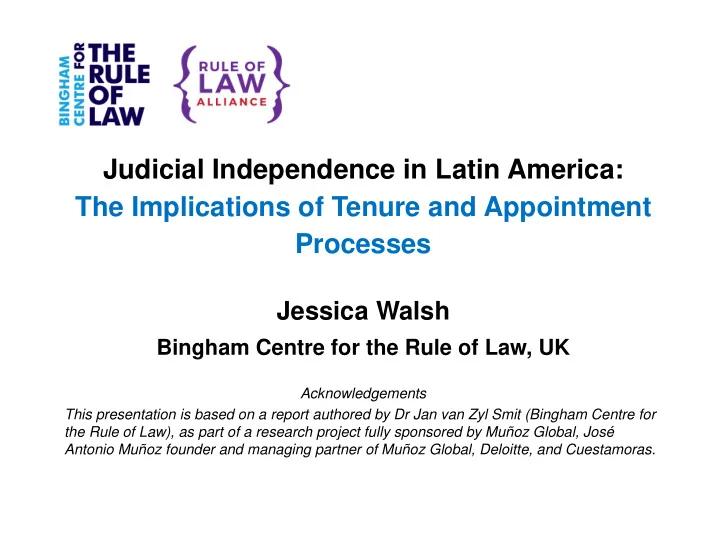

Judicial Independence in Latin America: The Implications of Tenure and Appointment Processes Jessica Walsh Bingham Centre for the Rule of Law, UK Acknowledgements This presentation is based on a report authored by Dr Jan van Zyl Smit (Bingham Centre for the Rule of Law), as part of a research project fully sponsored by Muñoz Global, José Antonio Muñoz founder and managing partner of Muñoz Global, Deloitte, and Cuestamoras.
Judicial Independence Judicial Independence Actual independence of judges who adjudicate without fear or favour to anyone, including the government Perceived independence that gives members of the public the confidence to submit their disputes to judicial resolution Legal safeguards such as tenure, appropriate processes for appointment and discipline, protection of salaries, budget guarantees, administrative autonomy. Legal safeguards are not an end in themselves, but rather a means to strengthen actual and perceived independence.
Judicial Independence Judicial Independence Our study focuses on two particular safeguards: • Tenure • Appointment processes We use an international and comparative method to consider the approach of Latin American jurisdictions.
Te Tenure The UN Basic Principles on the Independence of the Judiciary (1985) seem to allow: • Fixed-term appointments • Permanent appointments (usually until a standard retirement age) However, international opinion and practice has increasingly shifted towards permanent appointments.
Te Tenure Inter-American Commission on Human Rights (2013): “an established and sufficiently lengthy term gives the justice operator the sense of job stability needed to perform his or her functions with a sense of independence and autonomy, without succumbing to pressure or having to fear that the appointment still has to be confirmed or ratified”
Te Tenure In the highest courts of Latin America it is still rare to have permanent appointments, but there have been some innovative responses: • Automatic renewal of appointments • Prohibiting re-appointment • Allowing re-appointment only after a period not in office In lower courts, many jurisdictions have a “career judiciary”, but tenure is still a concern among judges. Heavy reliance on temporary and provisional judges is still a problem.
Appointment Pr Appointment Processes ocesses International norms on the appointment of judges are undergoing rapid development. These now require: • detailed criteria to promote selection on merit and judicial diversity • an independent appointment body such as a judicial council to depoliticise appointments • rigorous and fair assessment of candidates against published criteria • transparency to both prospective candidates and the general public
Appointment Pr Appointment Processes ocesses In the highest courts of Latin America (constitutional and supreme courts): • Appointments are still mostly in the hands of the political branches of the executive or legislature • Safeguards include supermajority requirements (eg 2/3 vote), and screening of candidates by judicial councils or nominating commissions • Transparency is sometimes required to ensure safeguards work properly
Appointment Pr Appointment Processes ocesses In other courts below the highest courts: • Judicial councils are now responsible for appointments in the majority of Latin American jurisdictions. • The composition of councils has often been controversial, particularly the inclusion of political representatives. • Methods of assessing and evaluating candidates are also important. See the Cape Town Principles on the Role of Independent Commissions in the Selection and Appointment of Judges.
Available Online ailable Online Full Report (English / Spanish) Executive Summary (English / Spanish / Portuguese) Download for free at: - http://binghamcentre.biicl.org/publications/reports - http://munozglobal.com/ Acknowledgements This presentation is based on a report authored by Dr Jan van Zyl Smit (Bingham Centre for the Rule of Law), as part of a research project fully sponsored by Muñoz Global, José Antonio Muñoz founder and managing partner of Muñoz Global, Deloitte, and Cuestamoras.
Recommend
More recommend